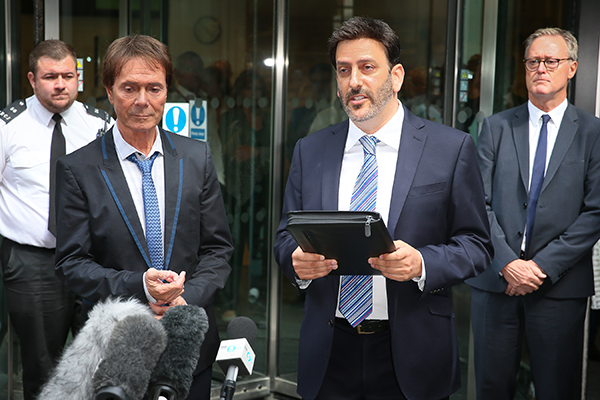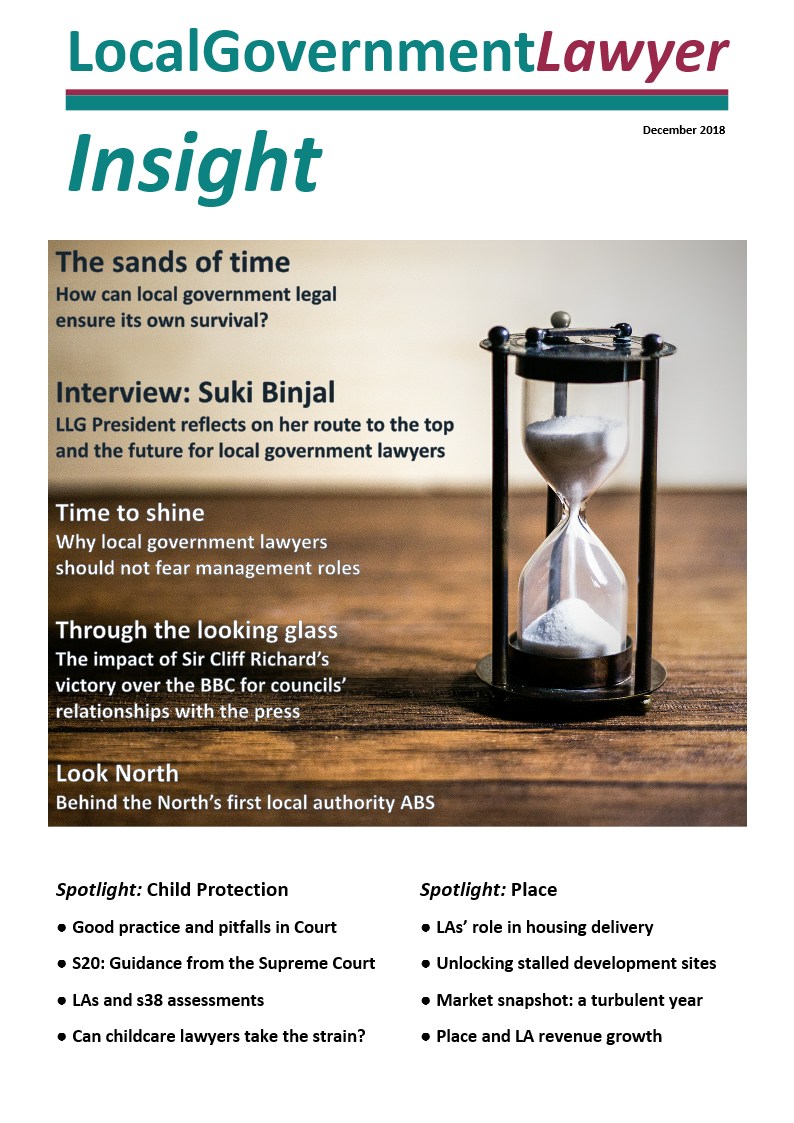Through the looking glass
- Details
Rosalee Dorfman Mohajer looks at the implications of the Cliff Richard judgment against the BBC and South Yorkshire Police for local authorities when they share information with the press.
 Sir Cliff Richard v the British Broadcasting Corporation and The Chief Constable of South Yorkshire Police [2018] EWHC 1837 (Ch) (18th July 2018)
Sir Cliff Richard v the British Broadcasting Corporation and The Chief Constable of South Yorkshire Police [2018] EWHC 1837 (Ch) (18th July 2018)
On 14th August 2014 South Yorkshire Police searched the home of Sir Cliff Richard, as part of an investigation into a complaint of historic child sexual abuse. This was not an ordinary search – the BBC had rolling live coverage with a helicopter filming the celebrity and police searching his flat. The BBC found out about the investigation from a source who should not have revealed it to them and the South Yorkshire Police notified them of the search date. In 2016 the investigation was dropped.
Sir Cliff Richard brought a claim against South Yorkshire Police for informing the BBC and the BBC for informing the world, thereby infringing his privacy and data protection rights. The High Court found that the defendants did infringe Sir Cliff’s privacy rights and declined to determine his data protection rights because the claimant would not get higher awards. Accordingly, the defendants had to pay £210,000 in damages which was split 65:35 as between the BBC and South Yorkshire Police.
In this case Mr Justice Mann had to balance two competing rights – the individual’s right to respect for his private and family life (Article 8 European Convention on Human Rights(CEHC) and the right to freedom of expression (Article 10 ECHR), which underlies press freedom.
He came down on the side of the individual, and perhaps inadvertently, made a significant change in the law by stating that the prima facie position, i.e. a presumption, that an individual will have a legitimate expectation that a criminal investigation against them will be kept private, which then raises the conflict between Article 8 and Article 10. Below I set out Mann J’s reasoning and lessons for local authorities when working with the media.
Analysis of judgment
The approach the judge took to considering Sir Cliffs’s claim was: (1) Did Sir Cliff have a legitimate expectation of privacy in relation to the investigation and search? (2) If so, was there an infringement of his privacy rights and what were the damages?
In short, the judge found that the answer was yes to both questions. The judge found that prima facie an individual has a legitimate expectation of privacy, in part based on the recommendations of the Leveson inquiry report.
Sir Cliff’s status as a famous celebrity did not mean he had a lower expectation of privacy, especially in relation to a criminal investigation.
As such, the Article 8 right to respect for private and family life was engaged. Mann J had to balance the private life right with the freedom of expression right and determine whether the BBC was justified in interfering with Sir Cliff’s right and whether it was proportionate to do so.
The judge considered a number of criteria to answer these questions and decided each one in favour of Sir Cliff. In particular, he found that reporting the scoop was not in the public interest because it was done with the sole aim of satisfying a reader’s interest in the person’s private life:
“Knowing that Sir Cliff was under investigation might be of interest to the gossip-mongers, but it does not contribute materially to the genuine public interest in the existence of police investigations in this area.” [282]
Although the BBC did publish accurate information, they used questionable methods of obtaining it. Their source from Operation Yewtree should not have revealed it to them and they knew it was private and sensitive information. In addition, the BBC breached their own Ethical Guidelines by not giving Sir Cliff a genuine right of reply.
The judge sharply criticised the sensationalist presentation of the story which he said weighed against the public interest of freedom of expression. In addition the unnecessary use of the helicopter was aimed to increase the impact. The BBC appeared to disregard the consequences of the individual, which for a person like Sir Cliff were very serious.
Although the criminal law requires a presumption of innocence, the judge criticised the BBC for not taking into account that the public would likely not maintain that presumption:
“The failure of the public to keep the presumption of innocence in mind at all times means that there is inevitably going to be stigma attached to the revelation, which is magnified in this case by the nature of the allegations against him, which were allegations (especially in the then climate) of extreme seriousness.” [316]
Surprisingly the judge found that there was not a public interest in identifying people who have engaged in historic sex abuse. He downplayed the constitutional importance of this judgment, finding that press did not have a right to report the truth about the police investigation [322].
Impact and lessons for local authorities
The finding that a person under police investigation has a prima facie reasonable expectation of privacy, in that the investigation would not be made public, may have the most significant impact on press freedom.
If this legal position is correct and applied to other cases, then it may prevent public interest journalism on police investigations because, in many cases, there would be conflict between the Article 8 and Article 10 rights and the court (or police officers and journalists who have to make frequent decisions on disclosure) may take a view that it should not be published because the alleged infringement of privacy rights is not justified.
Local authorities should carefully consider whether or not to share information online or with the press if there is an ongoing criminal or civil case investigation.
Although the Sir Cliff case concerns investigations and searches, the judgment could apply more generally to disclosures to the press concerning individuals who have a right for their information to be kept private.
The presumption should be not to share it unless there is a strong public interest in doing so. Applying the judge’s approach, officers should consider the following steps in assessing whether or not to share the information and allow it to be published:
1. Does the individual expect that the investigation will be kept private? The rebuttable presumption is that the individual does have such an expectation.
2. If so, if it is published, would there be an infringement of his/her privacy rights (Article 8)?
3. Finally, balance the competing right of the press, freedom of expression (Article 8), with the privacy right of the individual. Decide whether it would be justified and proportionate to infringe the privacy right by weighing the following factors:
- Would the reporting of the investigation contribute to a debate of general interest?
- How well-known is the person concerned and what is the subject of the report?
- Prior conduct of the person concerned. Is the coverage of the event already in publication?
- Method of obtaining the information and its veracity. Do the methods adhere to ethical guidelines?
- Content, form and consequences of the publication. How severe would the consequences be for the individual?
- Severity of the sanction imposed. What would be the effect of the sanction of not reporting the investigation?
Instead of appealing the judgment, the BBC have decided to ask the Attorney General for advice on the impact of the case on future reporting. Any further clarification on what police can share with journalists will be welcomed by practitioners across the country.
Rosalee Dorfman Mohajer is a Third Six Pupil Barrister, 4-5 Gray’s Inn Square Chambers.

This article was first published in the December 2018 edition of Local Government Lawyer Insight, which can be accessed at http://www.localgovernmentlawyer.co.uk/insight Insight is published four times a year and is circulated free-of-charge to all Local Government Lawyer newsletter subscribers (click here to subscribe) in electronic format. A single hard copy is also circulated to all local authority legal departments in England and Wales. Also in this issue: Sands of time Interview: Suki Binjal Time to shine Through the looking glass Look North Spotlight: Child Protection
Spotlight: Place
|
Head of Legal Services / Deputy Monitoring Officer
Director of Governance
Locums
Poll


















